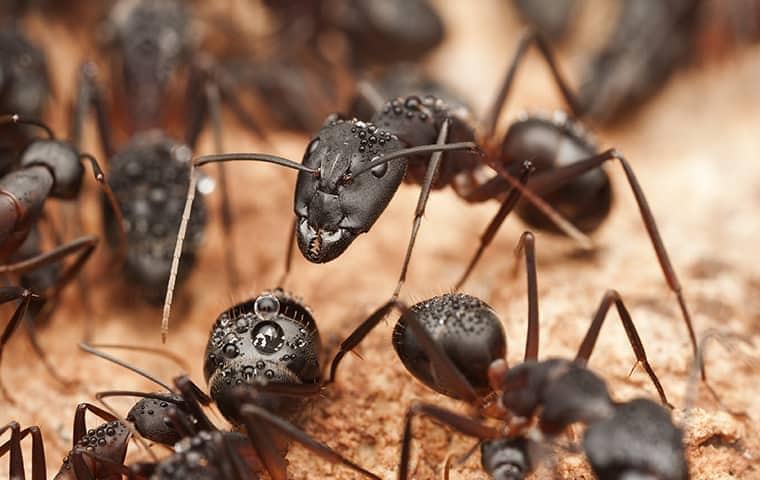Environmental Influence of Bug Control: Balancing Effectiveness With Sustainability
The environmental influence of bug control is a vital concern that calls for a delicate balance between accomplishing performance in managing insects and guaranteeing sustainability of our ecosystems. From the usage of unsafe chemicals that permeate right into our soil and water to the unintended effects on non-target varieties, the consequences of standard pest control techniques are far-ranging.
Unsafe Chemicals in Pest Control
The utilization of unsafe chemicals in pest control postures considerable environmental and wellness dangers that require careful consideration and mitigation methods. Herbicides, pesticides, and insecticides are typically utilized to remove insects, but their prevalent application can lead to unplanned repercussions. These chemicals can infect soil, water resources, and the air, influencing not just the targeted parasites but also advantageous bugs, wildlife, and human beings.

To address these risks, incorporated insect administration (IPM) methods are being promoted as a much more lasting alternative. IPM includes a mix of methods such as biological control, habitat manipulation, and the targeted use chemicals as a last hope (ant control kernersville nc). By adopting a holistic technique to pest control, we can decrease the environmental and health influences connected with damaging chemicals while effectively handling pest populations
Effect on Non-Target Types
Considering the unintentional repercussions of parasite control methods, the influence on non-target types is a critical aspect that calls for detailed assessment. While insect control actions intend to target specific pests, other microorganisms in the community might be accidentally impacted. Non-target types, consisting of beneficial pests, birds, animals, and also plants, can suffer indirect or direct harm from pesticide applications or biological control methods.
Chemicals can have dangerous or sub-lethal effects on non-target varieties. As an example, pesticides made to deal with a certain insect pest may hurt pollinators like or all-natural killers such as ladybugs. Furthermore, chemical residues can gather in the setting, affecting non-target organisms with time. Organic control representatives, if not species-specific, can position dangers to unintentional targets, interrupting the environmental equilibrium.
To reduce the influence on non-target types, incorporated pest management (IPM) strategies that highlight an alternative method to pest control are recommended. These methods prioritize using eco-friendly techniques, lessening damage to advantageous organisms while successfully handling pest populations. Carrying out extensive danger assessments and monitoring the results of bug control efforts are essential actions in guarding non-target species and advertising overall environment health.
Soil and Water Contamination
Unexpected environmental effects of insect control techniques expand beyond affecting non-target varieties, with significant ramifications for dirt and water contamination - termite control. Chemicals, herbicides, and chemical fertilizers made use of in parasite control can leach into the soil and pollute official website groundwater, presenting a threat to both water and earthbound ecosystems.
Water contamination is one more critical issue related to insect control techniques. Drainage from farming fields treated with pesticides can carry these chemicals into nearby water bodies, impacting water microorganisms and water top quality. Impurities in water resources can have far-ranging effects, influencing not just water life yet additionally human wellness via the intake of infected water or water microorganisms. To alleviate soil and water contamination from insect control activities, integrated pest management techniques that prioritize sustainability and minimize chemical inputs are important.
Air Contamination From Pesticide Use
Direct exposure to airborne chemicals during agricultural applications postures a considerable worry for air contamination control steps. In addition, pesticide drift, where pesticides are lugged by the wind to unintended locations, can lead to the contamination of nearby environments and water bodies.

Strategies for Sustainable Insect Control
In the world of agricultural methods, applying sustainable insect control techniques is extremely important for maintaining ecological balance and protecting plant returns. Lasting pest control emphasizes the use of ecologically pleasant techniques to take care of parasite populaces effectively while minimizing injury to non-target organisms and communities. Integrated Bug Administration (IPM) is a commonly embraced technique that incorporates organic, social, physical, and chemical control approaches to attain long-lasting bug administration services.
One secret method in lasting insect control is promoting biodiversity within agroecosystems. By enhancing all-natural adversaries of bugs, such as parasitoids and predators, farmers can lower the demand for artificial pesticides. Crop turning and diversity are additionally effective strategies to interrupt pest life cycles and create much less desirable conditions for pests to thrive. In addition, utilizing pest-resistant crop selections and utilizing techniques like catch cropping can aid minimize bug pressure without relying greatly on chemical treatments. Ultimately, by incorporating these lasting bug control approaches, farmers can achieve a balance in between pest monitoring efficiency and environmental stewardship.
Final Thought
In verdict, the environmental effect of pest control approaches should be carefully taken into consideration to stabilize effectiveness with sustainability. Harmful chemicals utilized in bug control can cause soil and water contamination, air pollution, and injury non-target varieties - termite control. It is critical to execute sustainable pest control strategies to reduce these adverse results on the environment and promote a healthier environment for future generations
By adopting an alternative strategy to pest control, we can decrease the environmental and health effects connected with dangerous chemicals while successfully taking care of pest populaces.

To reduce the air contamination triggered by chemical use, it is vital to adopt integrated parasite administration strategies that prioritize the usage of non-chemical pest control techniques, such as crop rotation, all-natural killers, and resistant plant varieties. Sustainable parasite control emphasizes the usage of environmentally friendly techniques to take care of insect populaces effectively while lessening harm to non-target organisms and ecosystems. Integrated Bug Management (IPM) is a widely embraced strategy that combines biological, cultural, physical, and chemical control approaches to attain long-lasting parasite management services.